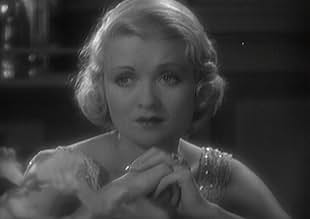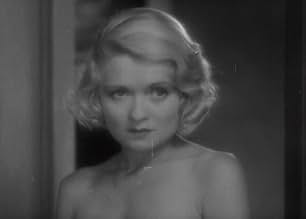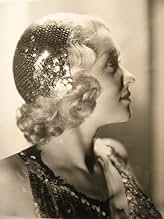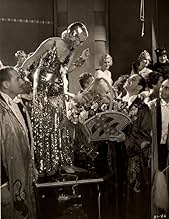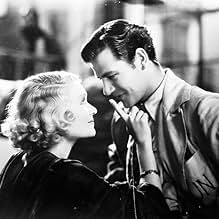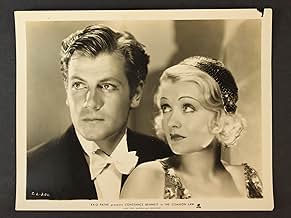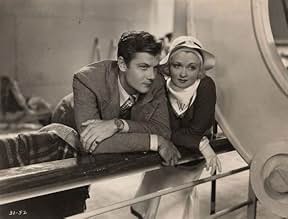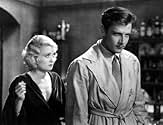Aggiungi una trama nella tua linguaYoung Valerie models for an American painter who tries to make a future in Paris and they fall in love.Young Valerie models for an American painter who tries to make a future in Paris and they fall in love.Young Valerie models for an American painter who tries to make a future in Paris and they fall in love.
- Regia
- Sceneggiatura
- Star
Emile Chautard
- Doorman
- (non citato nei titoli originali)
Albert Conti
- Strangeways Party Guest
- (non citato nei titoli originali)
Carrie Daumery
- Strangeways Party Guest
- (non citato nei titoli originali)
George Davis
- Charles - Dick's Butler
- (non citato nei titoli originali)
Julia Swayne Gordon
- Mrs. Strangeways
- (non citato nei titoli originali)
George Irving
- Doctor
- (non citato nei titoli originali)
Dolores Murray
- Queen at the Ball
- (non citato nei titoli originali)
Tom Ricketts
- Elderly Strangeways Party Guest
- (non citato nei titoli originali)
Marshall Ruth
- Strangeways Party Guest
- (non citato nei titoli originali)
Recensioni in evidenza
Joel McCrea was one of the great stars of Twentieth Century movies. I'm not thinking of the Westerns for which he was best known, eventually, but for his light comedy, slapstick, and serious comedy. Not to mention his starring role in one of Hitchcock's very best: "Foreign Correspondent." It seems as if many of the fine directors wanted to work with him. In addition to Hitchcock, Preston Sturges used him -- twice. In "Sullivan's Travels" he is certainly an alter-ego for the writer/director.
Early in his career he did light fare, often paired, as here, with Constance Bennett. He also worked with Miriam Hopkins on several occasions, including the far from comic "These Three." Here he is a painter in Paris. He's from a rich family but he's rebelling. He uses Bennett as a model -- and we see her nude. Not totally but first in her undergarments and then with a towel covering the parts we aren't allowed to see.
So how come he is such a prig when he finds out she is a lady with a past? He sure is, though.
The movie is filled with thudding quips and boring banter. It is fun overall but it definitely could have been a great deal better.
Early in his career he did light fare, often paired, as here, with Constance Bennett. He also worked with Miriam Hopkins on several occasions, including the far from comic "These Three." Here he is a painter in Paris. He's from a rich family but he's rebelling. He uses Bennett as a model -- and we see her nude. Not totally but first in her undergarments and then with a towel covering the parts we aren't allowed to see.
So how come he is such a prig when he finds out she is a lady with a past? He sure is, though.
The movie is filled with thudding quips and boring banter. It is fun overall but it definitely could have been a great deal better.
In Paul L. Stein's 1931 film "The Common Law", Constance Bennett plays Valerie West, a "kept woman" who decides that she needs to leave her sugar-daddy boyfriend Nick and make a go of it on her own. She ends up working as an artist's model for painter John Neville, Jr. (McCrea), and while they begin their relationship as friends, the two soon become lovers. Unfortunately, there are a number of factors against them, namely Valerie's past as a kept woman and John's sister Claire (Hopper), who believes that Valerie is less than acceptable for their blue blood family. During his bouts of indecision, he succumbs to fits of jealousy about Valerie's past and finds it hard to trust her to be true to him, especially when she suggests they wait until they are absolutely sure of their love before they get married. Valerie, on the other hand, knows that she loves John but is afraid she will get hurt, particularly when she sees the rich life of which John's family are members.
There are a few notable things about "The Common Law", despite its relatively simple plot and short running time. Being a Pre-Code film, the role of Valerie is juicy without being compromised and saddled with social morays. It is clear that Valerie lived with both Nick and John and was married to neither of them, something that just was not expressed in post 1934 films. (The irony of this censorship doesn't escape me either; one would think that there would be a progression as the medium grows and not a recession.) This is where the title "The Common Law" is derived, and it is only near the end of the film when Valerie begins to feel personal and social pressure that she acquiesces to marry. It is left to the audience to interpret whether she is entirely comfortable with the situation, but she does not hide her apparent joy over her ultimate decision; it almost seems like a weight has been lifted off her shoulders.
Also notable are various obvious innuendos (like when Valerie is leaving Nick and he suggests, not cruelly, that she could perhaps survive well as a call girl) and the first scene in which Valerie poses nude for John, not five minutes after he hires her as a model. She is clearly uncomfortable, but loses her inhibitions quickly and though her form is not clear, the scene ends with a long shot showing her lying naked on the platform. This would have been unheard of in a post-code era where even the amorous Nick and Nora Charles were relegated to twin beds.
Constance Bennett, one of the most popular screen sirens of the pre-code Hollywood era, plays Valerie as tough, savvy and intelligent, but with one look she is able to express vulnerability and sadness. Her incredible beauty and impeccable style (her clothes not only look like they were made specifically for her, but are timeless as well) are literally breathtaking. There is no doubt that she is a star of enormous quality and talent. Particularly during this early period of "talkies", there were a plethora of actors and actresses who may have looked gorgeous but couldn't act their way out of a paper bag. It was those who could that became immortalized and revered, and Bennett more than deserves a place in this upper echelon. Unfortunately, this praise can't extend to the rest of the featured cast. Joel McCrea obviously hadn't hit his stride yet, though he had made over a dozen pictures before this one. Though he plays his usual role, the handsome, earnest and ruffled hero, it would be a few more years before he shows some of the greatness that he exhibited in films like "These Three" or a decade later in "Sullivan's Travels". While he is likable in this film (other than when he is being a jealous ass) it is obvious that there are times when he is waiting for his cues, and the delivery is wooden. I have never seen Hedda Hopper in a film other than when she had a cameo in "Sunset Boulevard", so I was first surprised when I saw her name in the credits and even more surprised when I did more research and saw that she actually did 82 other films BEFORE this one was released. And here I thought she was simply a gossip columnist though if her work in "The Common Law" is indicative of the rest of her repertoire, then she found her true calling about 130 films too late. Unfortunately, her nosiness and rumored bitchiness in real life could not be channeled into her role as McCrea's bitchy and nosy sister because she was just terrible.
"The Common Law" is a fine example of Hollywood's pre-code era, when women didn't have to be saints, or if they were "subversive" (by Hays Code standards) they would be punished in the end. Instead we have a strong female role in which her strength is complimented by moments of vulnerability, and despite a non-adherence to a strict moral code dictated by some sects of society, there is a happy ending after all. 6/10 --Shelly
There are a few notable things about "The Common Law", despite its relatively simple plot and short running time. Being a Pre-Code film, the role of Valerie is juicy without being compromised and saddled with social morays. It is clear that Valerie lived with both Nick and John and was married to neither of them, something that just was not expressed in post 1934 films. (The irony of this censorship doesn't escape me either; one would think that there would be a progression as the medium grows and not a recession.) This is where the title "The Common Law" is derived, and it is only near the end of the film when Valerie begins to feel personal and social pressure that she acquiesces to marry. It is left to the audience to interpret whether she is entirely comfortable with the situation, but she does not hide her apparent joy over her ultimate decision; it almost seems like a weight has been lifted off her shoulders.
Also notable are various obvious innuendos (like when Valerie is leaving Nick and he suggests, not cruelly, that she could perhaps survive well as a call girl) and the first scene in which Valerie poses nude for John, not five minutes after he hires her as a model. She is clearly uncomfortable, but loses her inhibitions quickly and though her form is not clear, the scene ends with a long shot showing her lying naked on the platform. This would have been unheard of in a post-code era where even the amorous Nick and Nora Charles were relegated to twin beds.
Constance Bennett, one of the most popular screen sirens of the pre-code Hollywood era, plays Valerie as tough, savvy and intelligent, but with one look she is able to express vulnerability and sadness. Her incredible beauty and impeccable style (her clothes not only look like they were made specifically for her, but are timeless as well) are literally breathtaking. There is no doubt that she is a star of enormous quality and talent. Particularly during this early period of "talkies", there were a plethora of actors and actresses who may have looked gorgeous but couldn't act their way out of a paper bag. It was those who could that became immortalized and revered, and Bennett more than deserves a place in this upper echelon. Unfortunately, this praise can't extend to the rest of the featured cast. Joel McCrea obviously hadn't hit his stride yet, though he had made over a dozen pictures before this one. Though he plays his usual role, the handsome, earnest and ruffled hero, it would be a few more years before he shows some of the greatness that he exhibited in films like "These Three" or a decade later in "Sullivan's Travels". While he is likable in this film (other than when he is being a jealous ass) it is obvious that there are times when he is waiting for his cues, and the delivery is wooden. I have never seen Hedda Hopper in a film other than when she had a cameo in "Sunset Boulevard", so I was first surprised when I saw her name in the credits and even more surprised when I did more research and saw that she actually did 82 other films BEFORE this one was released. And here I thought she was simply a gossip columnist though if her work in "The Common Law" is indicative of the rest of her repertoire, then she found her true calling about 130 films too late. Unfortunately, her nosiness and rumored bitchiness in real life could not be channeled into her role as McCrea's bitchy and nosy sister because she was just terrible.
"The Common Law" is a fine example of Hollywood's pre-code era, when women didn't have to be saints, or if they were "subversive" (by Hays Code standards) they would be punished in the end. Instead we have a strong female role in which her strength is complimented by moments of vulnerability, and despite a non-adherence to a strict moral code dictated by some sects of society, there is a happy ending after all. 6/10 --Shelly
The common law in "The Common Law" is that a girl is better off married than living in sin. That's a message that the Hays Code censors could have gotten behind, but they never could have approved this 1931 film. In 1931, the Hays Code was in effect but the Production Code Administration and its tough boss Joe Breen, which rigidly enforced the Code, didn't come into existence until 1934. As a result, the studios were able to ignore the Code and get away with sexual themes that would soon become utterly unthinkable. This was a necessity in 1931 because sex brought people into the theaters and the industry was desperate to sell tickets during the depths of the Depression.
Valerie West, an American in Paris, makes her living by being the mistress of a rich American, Dick Cardemon, but she dumps him and starts a career as a nude model. She models for a mediocre but rich American painter named John Neville who falls madly in love with her. However, he evidently assumed she was a virgin because he dumps her when he finds out about Cardemon.
Later Valerie manages to pick up John once again at a very sexy Artists' Ball (there's a still photo of the ball in Vieira, "Sin in Soft Focus" (1999), p. 56). This time Valerie and John decide to live together without getting married, but that causes quite a scandal back home. John's snooty family tries to break them up, but...
The film is a very effective attack on the sexual double standard and on American upper-class conspicuous consumption, snootiness, and prudishness. Attacks on the upper class were quite popular in the early 1930's, given people's desperation in the Depression and the natural tendency to blame the rich for what happened. The film also shows that a smart, spunky, and beautiful girl can make very good despite having engaged in lots of free love (not to mention nude modeling) with rich men. Valerie is not punished for all that sin--in violation of the so-called "compensating values" norm later enforced by Breen and the Production Office. That norm would require that she receive some horrible punishment for engaging in extra-marital sex--but quite to the contrary, Valerie comes out just fine.
The film is an exceptionally interesting example of the kind of movies that were made at the beginning of the sound era but before the curtain came down in 1934 on candid treatments of sexual behavior.
Valerie West, an American in Paris, makes her living by being the mistress of a rich American, Dick Cardemon, but she dumps him and starts a career as a nude model. She models for a mediocre but rich American painter named John Neville who falls madly in love with her. However, he evidently assumed she was a virgin because he dumps her when he finds out about Cardemon.
Later Valerie manages to pick up John once again at a very sexy Artists' Ball (there's a still photo of the ball in Vieira, "Sin in Soft Focus" (1999), p. 56). This time Valerie and John decide to live together without getting married, but that causes quite a scandal back home. John's snooty family tries to break them up, but...
The film is a very effective attack on the sexual double standard and on American upper-class conspicuous consumption, snootiness, and prudishness. Attacks on the upper class were quite popular in the early 1930's, given people's desperation in the Depression and the natural tendency to blame the rich for what happened. The film also shows that a smart, spunky, and beautiful girl can make very good despite having engaged in lots of free love (not to mention nude modeling) with rich men. Valerie is not punished for all that sin--in violation of the so-called "compensating values" norm later enforced by Breen and the Production Office. That norm would require that she receive some horrible punishment for engaging in extra-marital sex--but quite to the contrary, Valerie comes out just fine.
The film is an exceptionally interesting example of the kind of movies that were made at the beginning of the sound era but before the curtain came down in 1934 on candid treatments of sexual behavior.
... because there is nothing at all remarkable about the plot. At the beginning of the film Valerie West (Constance Bennett) is seen packing a bag, ending a "common law" relationship with Dick Carmedon (Lew Cody) as he tells her she will have only prostitution to fall back on if she leaves him. Nothing keeps a gal from leaving you like telling her you have such a high opinion of her! Valerie's reply is "That gives me an idea". (HOW???) and she takes a job as a model for an artist, John Neville (Joel McCrea). It's a nude modeling job, and Valerie is shy about this. Probably the highlight of the film at that time (heck, now, too!) is a long shot that follows in which it appears you have a full nude side view of Constance Bennett, but it is far enough and blurry enough that she must have had some kind of skin tight outfit on. The precode days had their limits you know! This has all the earmarks of any number of films in which rich guy (McCrea) falls for poor girl (Bennett) with shady past but good character while others (his sister, her old lover) try to undermine the situation and break them up. There are some things that distinguish it. One is Joel McCrea as an American in Paris who is not even trying to hide his natural western twang, which really comes out whenever he is playing the part angry It does get funny at times, especially when you meet the rest of his family - understanding dad and plotting sister - and realize that they don't sound western at all! Where on earth did this accent come from? I fault the director here, because McCrea had modern dress parts before and after this and was able to sound not so Western when the role required it.
Let me also commend Hedda Hopper here. She was great as McCrea's snobby sister who is smiling the whole time she is trying to manipulate Valerie out of her brother's life. She almost steals the show, but then nobody steals a show from Joel McCrea in my humble opinion!
Let me also commend Hedda Hopper here. She was great as McCrea's snobby sister who is smiling the whole time she is trying to manipulate Valerie out of her brother's life. She almost steals the show, but then nobody steals a show from Joel McCrea in my humble opinion!
A professionally made and superbly acted reflection of what respectability was considered to be at time when the old world gave way to our modern one. It's the familiar 'can love survive across the class divide' story but done with class.
My only criticism is that Paul Stein's direction is quite humourless and unemotional so it doesn't engage with you that easily. It's much more realistic than typical 1931 pictures but that lack of melodrama doesn't quite give this as much impact as some of its contemporaries. It is however a great time capsule reflecting the sexual and class based hypocrisies that prevailed at the time.
Another silly frustration for any red blooded male is Stein's habit of banishing his camera to the furthest darkest distance possible from Miss Bennett when she takes her clothes off, it's actually a lot more prudish than you might expect from a film about a nude model in 1931! Although she's not especially alluring or erotic, Constance Bennett is pretty fabulous in this. You can see why she commanded such a massive salary - her acting is outstanding, she's totally convincing, you're not watching an actress, you're watching Valerie, a real person, a fairly modern person whom you can really relate to and sympathise with today.
A real benefit in this is Robert Williams who injects just the right amount of good humour as McCrea's friend. Such a tragedy that he died before his career really took off - he would easily have been as good in those best friend roles Frank McHugh or Charles Ruggles monopolised and very likely, a leading man; such a shame. His cheerful nature adds a necessary lightness to this picture because as good as it is, it is a little cold and dry.
My only criticism is that Paul Stein's direction is quite humourless and unemotional so it doesn't engage with you that easily. It's much more realistic than typical 1931 pictures but that lack of melodrama doesn't quite give this as much impact as some of its contemporaries. It is however a great time capsule reflecting the sexual and class based hypocrisies that prevailed at the time.
Another silly frustration for any red blooded male is Stein's habit of banishing his camera to the furthest darkest distance possible from Miss Bennett when she takes her clothes off, it's actually a lot more prudish than you might expect from a film about a nude model in 1931! Although she's not especially alluring or erotic, Constance Bennett is pretty fabulous in this. You can see why she commanded such a massive salary - her acting is outstanding, she's totally convincing, you're not watching an actress, you're watching Valerie, a real person, a fairly modern person whom you can really relate to and sympathise with today.
A real benefit in this is Robert Williams who injects just the right amount of good humour as McCrea's friend. Such a tragedy that he died before his career really took off - he would easily have been as good in those best friend roles Frank McHugh or Charles Ruggles monopolised and very likely, a leading man; such a shame. His cheerful nature adds a necessary lightness to this picture because as good as it is, it is a little cold and dry.
Lo sapevi?
- QuizThe screenplay was written by John Farrow. Five years later he married actress Maureen O'Sullivan, with whom he had seven children including actress Mia Farrow.
- Citazioni
John Neville Sr.: You're getting more like your mother every day.
Mrs. Claire Collis: I should think that would make you very happy.
John Neville Sr.: It does. And a little apprehensive.
- ConnessioniFeatured in Thou Shalt Not: Sex, Sin and Censorship in Pre-Code Hollywood (2008)
I più visti
Accedi per valutare e creare un elenco di titoli salvati per ottenere consigli personalizzati
Dettagli
- Data di uscita
- Paese di origine
- Lingue
- Celebre anche come
- Diosas de Montmartre
- Luoghi delle riprese
- Parigi, Francia(second unit, background and establishing shots)
- Azienda produttrice
- Vedi altri crediti dell’azienda su IMDbPro
Botteghino
- Budget
- 339.000 USD (previsto)
- Tempo di esecuzione1 ora 14 minuti
- Colore
Contribuisci a questa pagina
Suggerisci una modifica o aggiungi i contenuti mancanti

Divario superiore
By what name was The Common Law (1931) officially released in India in English?
Rispondi
